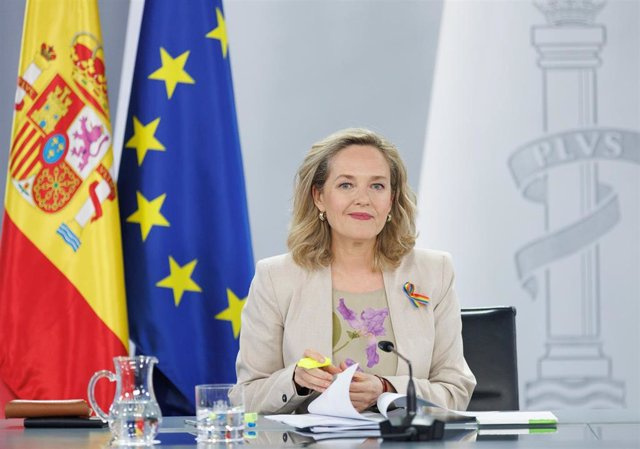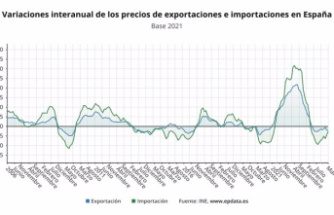The regulation includes the regulation of cross-border transformations, mergers and divisions, such as the one carried out by Ferrovial
MADRID, 29 Jun. (EUROPA PRESS) -
The Official State Gazette (BOE) publishes this Thursday the Royal Decree-Law that the Council of Ministers approved last Tuesday to give continuity to some of the anti-crisis measures that expired tomorrow, June 30, among which are the reductions in VAT on food and aid for public transport.
This package of measures mobilizes an additional 3,800 million euros, although the total impact --taking into account the total aid, with tax cuts and bonuses-- is 8,900 million euros in the second part of the year. In total, the seven packages approved by the Executive in response to the impact of the war and the escalation of prices have exceeded 47,000 million euros.
The new approved package, which will enter into force tomorrow, maintains the suppression for six more months of the 4% VAT that is applied to all basic foods, including bread, flour, milk, cheese or eggs , and the reduction from 10% to 5% of oil and pasta.
Among the basic foods that see the 4% VAT eliminated, common bread stands out, as well as frozen common bread dough and frozen common bread exclusively for making common bread; bread-making flours; the following types of milk produced by any animal species: natural, certified, pasteurized, concentrated, skimmed, sterilized, UHT, evaporated, and powdered; the cheeses; eggs and fruits, vegetables, legumes, tubers and cereals, which have the status of natural products in accordance with the Food Code.
All these tax reductions will remain in force until December 31, 2023 as long as the interannual rate of underlying inflation is above 5.5%. If it falls below that rate in the month of September, whose data will be known in October, the usual VAT tax rate on the aforementioned food in the last two months scheduled for the application of the measure would be recovered. That is, since November 1.
In addition, among other aids that expire tomorrow and that have been extended with the Royal Decree-Law published today in the BOE, there is also the reduction in the price of passes and multi-journey tickets for public transport (the Renfe suburban and medium-distance discount is already it had gone on all year).
The Government will continue to subsidize the public transport of the rest of the administrations with 30% as long as they commit to increasing this discount to 50%.
The Royal Decree-Law also extends the labor measures related to the enjoyment of public aid. In this way, the increase in energy costs may not constitute an objective cause for dismissal until December 31, 2023. Failure to comply with this obligation will entail the reimbursement of the aid received.
Companies that take advantage of the measures to reduce working hours or suspend contracts for reasons related to the invasion of Ukraine and that benefit from public support will not be able to use these causes to carry out dismissals.
Diesel aid for professional transporters, farmers and ranchers is also extended, so that until September 30 the bonus will be 10 euro cents per liter, while in the last quarter of the year it will be 5 cents per liter.
In addition, direct aid is included for road transport professionals who are not subject to professional diesel, and therefore do not benefit from this discount, and for maritime transport services of public interest.
Additionally, the regulation extends the support measures for the island of La Palma in terms of Social Security, in the labor field and in the mortgage field, extending for another 6 months the regime of suspension of interest and principal payment obligations of the mortgages of those affected by the volcanic eruption registered in the Cumbre Vieja area.
Among other issues, the Temporary Employment Regulation Files (ERTE) linked to the situation of temporary force majeure are extended until December 31, 2023 in the case of affected companies and workers from the Canary Islands.
As a consequence of the dissolution of the Cortes Generales due to the electoral advance, the Permanent Deputation, the only body that remains standing, will be the one that assumes the power to validate or repeal the measures contained in the Royal Decree-law.
The Government has eliminated from the package of measures the possibility of extending the validity of rental contracts by six months with the same terms and conditions established in the contract that were in force.
Of course, the limitation of the annual update of the rent of the housing lease contracts that prevents increases of more than 2% is already extended until December 31, 2023.
The suspension of the eviction procedure and of the releases for vulnerable households when there is no housing alternative will be maintained until the end of the year.
On the other hand, the regulation extends the period during which landlords and homeowners affected by the extraordinary suspension of eviction or release may submit the request for compensation, setting the new period until January 31, 2024.
The standard transposes a European directive to regulate cross-border transformations, mergers and divisions, an operation like the one carried out recently by Ferrovial to move its headquarters to the Netherlands. As specified in the BOE, the provisions contained in the law referring to the transposition of this directive will enter into force within a month, that is, on July 29.
The draft of this law was approved by the Government on February 14, before Ferrovial announced its intention to move to the Netherlands. In that text, the Executive already stated that the mobility of companies within Europe should be promoted "in order to improve the functioning of the internal market."
In fact, the standard facilitates and simplifies legal work when analyzing structural modification operations of mercantile companies in internal European and extra-European operations.
However, it also introduces some limitations, enabling the Mercantile Registry to control the legality of the operation and to issue a prior certificate attesting that all the required conditions have been met.
If all the required conditions are not met, the Registry will not issue the prior certificate and will inform the company of the reasons for its decision and will offer it the opportunity to correct the defects observed within a period not exceeding 30 days.
If the rectification does not take place within this period, the Registry will deny the prior certificate and the operation cannot be carried out. Exceptionally, the initial period of three months will be extended for a maximum of three more months if, as a result of the documentation and information presented, the Registry has well-founded suspicions that the operation submitted is carried out for abusive or fraudulent purposes, which have as their object or produce the effect of evading the law of the European Union or Spanish, or serve criminal purposes.













